06:44
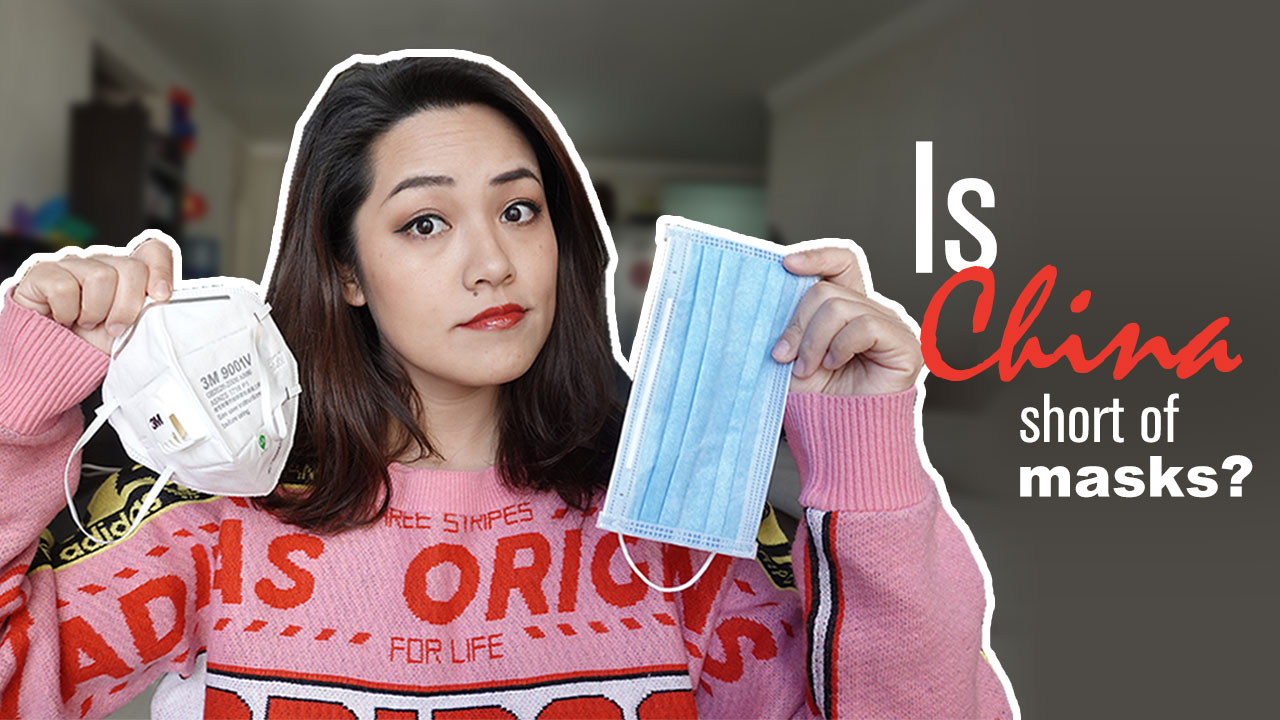
As the coronavirus spreads in China, everyone seems to be running short of facial masks. Pharmacy shelves were scooped bare. E-commerce sites see their stocks gone in seconds. Even doctors battling against the virus had to recycle their masks due to limited supply.
As fear of the virus strains supplies, mask factories across China cancelled their Spring Festival break and rushed to increase production. In its latest press conference on Sunday, the Ministry of Industry and Information Technology said that by Monday the daily production capacity of mask factories would bounce back to 60 percent of the figure before the Lunar New Year holiday.
Yet the acute shortage of masks persists. "In the past, only those who are frail or those under special working conditions wear masks. But now, everyone wants to wear a mask and what's more, they want to have a few extra to hoard," said Wang Yu, deputy head of a mask factory in Beijing who preferred not to reveal the name of the factory because he is not authorized to speak.
His factory saw a huge jump in orders in late January. But due to a shortage of raw material supply during the Spring Festival holiday and travel control to contain the coronavirus outbreak, he cannot resume production as of now.
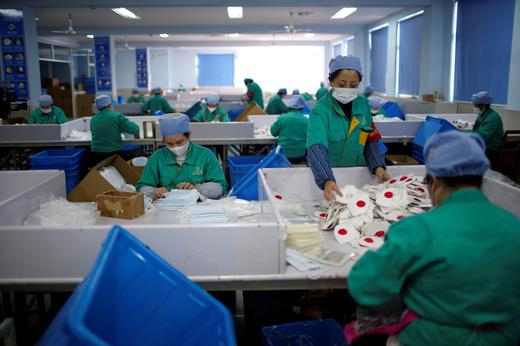
Workers are seen on a production line manufacturing masks at a factory in Shanghai, east China, January 31, 2020. /Reuters Photo
Workers are seen on a production line manufacturing masks at a factory in Shanghai, east China, January 31, 2020. /Reuters Photo
While a lack of surgical masks are reported in hospitals at Wuhan, the epicenter of the coronavirus epidemic, the shortage of N95 masks, advised by doctors as essential for those who interact with their patients, is much more severe.
There is a pretty low skill threshold to producing surgical masks: It is a highly automated business that relies on machines to process raw materials. The difficulty, however, lies in the production of filters, the thing that enables N95 masks to filter out small particles from the air.
"There are thousands of mask factories in China, but companies that are able to produce high-end filters up to the N95 or KN95 standard, number less than 10," Wang told CGTN.
Tianjin Teda Corporation is one of the biggest producer of filters in China. Around January 20, three days before the central China city of Wuhan was locked down, the company's order for a single day exceeded more than two million tons, almost an equivalent of its usual one-month's order.
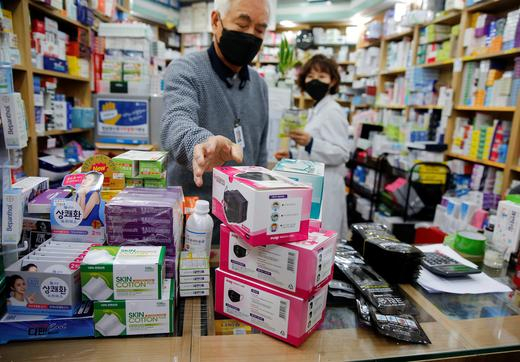
Pharmacist sells masks to prevent contracting coronavirus, at a pharmacy in Seoul, South Korea, January 31, 2020. /Reuters Photo
Pharmacist sells masks to prevent contracting coronavirus, at a pharmacy in Seoul, South Korea, January 31, 2020. /Reuters Photo
"We did not stop production at all during the Spring Festival break. We promised our workers three times their normal wages to get them back to work during the holiday," Hu Jun, chairman of Tianjin Teda Corporation, said in an interview with CGTN.
Filters produced by his company can now sustain the production of seven million masks per day, 35 percent of the daily mask production capacity in China.
Liu Jie, vice president of a company based in central China's Hunan Province, which also manufactures filters, said her company resumed production on Wednesday, cutting the Spring Festival holiday short due to high demand from mask producers.
Though her company had stocks for some clients, she said the difficulty lies in transportation. "We now require our clients to pick up the materials because there is no way for us to ship the orders." Delivery companies, on the other hand, cannot handle such a huge sum of products, she added.
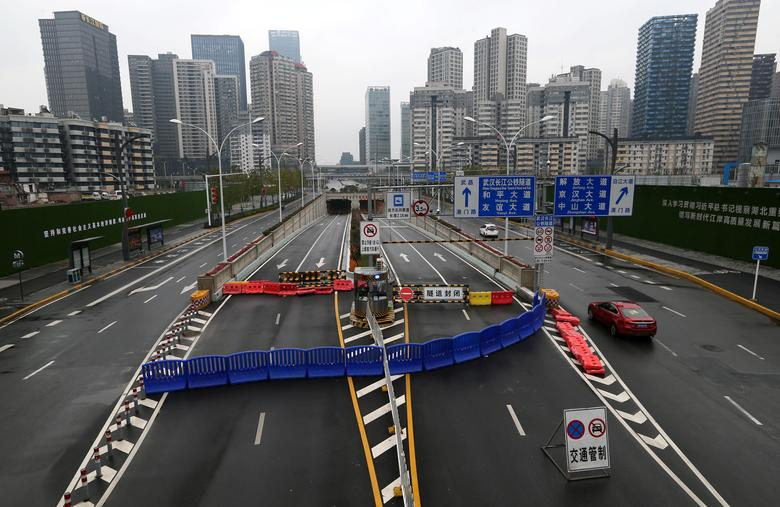
Wuhan Yangtze River Tunnel is blocked with a barrier following an outbreak of the new coronavirus and the city's lockdown, in Wuhan, Hubei province, January 25, 2020. /Reuters Photo
Wuhan Yangtze River Tunnel is blocked with a barrier following an outbreak of the new coronavirus and the city's lockdown, in Wuhan, Hubei province, January 25, 2020. /Reuters Photo
On top of that, since some inter-provincial highways are blocked, raw materials need to be shipped by air, Wang, the mask producer said. "But the problem is, we are talking about tons of materials which cost of delivery by air would be exorbitantly high."
Teda Corporation, on the other hand, was one of the lucky few that managed to ship tons of filters via highways in the curtailed traffic system. That was because they received assistance from the municipal government when shipping masks to the quarantined city of Wuhan.
Across China, all levels of central, municipal and provincial governments have vowed to assist producers of protective equipments in filling in the raw material supply gap, recruiting labor force and logistics coordination. A temporary redistribution system was also set up to ship production from major factories nationwide directly to the epicenter of the crisis in Hubei Province.
"As far as I know, almost all big mask factories are now responsible for alleviating the mask shortage for people in Wuhan and other regions of Hubei province," Wang said. "Major factories are responsible for production, not for sales."
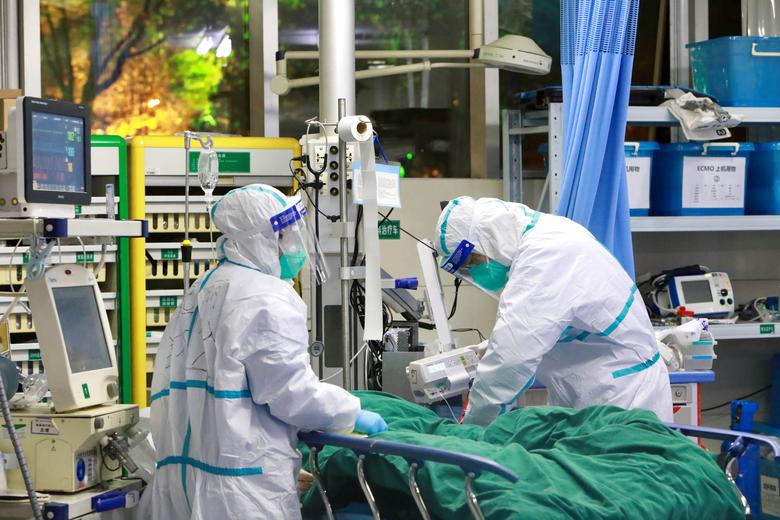
Medical staff in protective suits treat a patient with pneumonia caused by the new coronavirus at the Zhongnan Hospital of Wuhan University, Hubei Province, central China, January 28, 2020. /Reuters Photo
Medical staff in protective suits treat a patient with pneumonia caused by the new coronavirus at the Zhongnan Hospital of Wuhan University, Hubei Province, central China, January 28, 2020. /Reuters Photo
On Sunday, the Ministry of Industry and Information Technology said a review of available protective equipment shows that there is still a large gap between the production capacity of factories and the surging demand from the public. By far, the need of Wuhan and other regions of Hubei Province should be prioritized.
The shortage of masks almost struck everyone by surprise in China. Before the coronavirus hit, the country was the world's largest producer of masks, accounting for 50 percent of annual production in the world.
The number of mask factories grew almost overnight as demand for masks to protect against PM 2.5 surged in the early 2010s. Before 2013, China was home to 500 mask producers. That number grew to more than one thousand in two years.
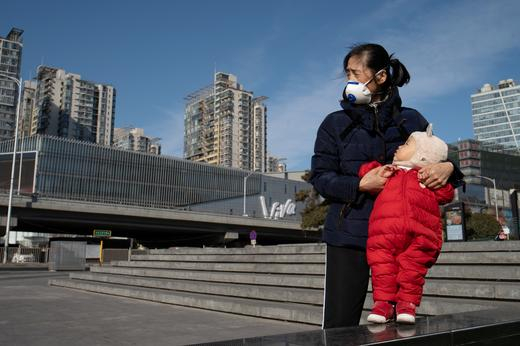
A woman wearing a facial mask holds a child near a shopping mall in Beijing, China, as the country is hit by an outbreak of the coronavirus, February 1, 2020. /Reuters Photo
A woman wearing a facial mask holds a child near a shopping mall in Beijing, China, as the country is hit by an outbreak of the coronavirus, February 1, 2020. /Reuters Photo
But the mask industry was not in good shape in years preceding the coronavirus outbreak. As a war against pollution was declared, major polluters, e.g. steel factories, coal mines, and cement factories, were closed or required to adopt measures to curb pollution, and thus the demand for masks dwindled.
"We lost many clients during those years... and we have a really low profit margin," Wang said looking back to the past few years.
There are signs that the shortage of masks is to be addressed. The government of Hangzhou announced on Sunday that residents can get up to five masks for free after reserving. The local government of Xiamen in East China's Fujian Province launched a lottery system for mask purchases. In Shanghai, residents can sign up to buy up to five masks.
Experts are also appealing to the public to save the N95 masks for medical professionals. Zhang Wenhong, head of the Shanghai medical team batting the coronavirus, said in an interview with CCTV that surgical masks are good enough for average citizens. "It is not necessary to wear a N95 for an average resident on the street," he noted.
Article writer: Yu Jing
On-camera reporter: Li Jingjing
Cameraman: Zhao Yuxiang
Video editor: Li Jingjing
Copy editor: Josh McNally
Chief editor: Xu Jian
Supervisor: Zhang Shilei